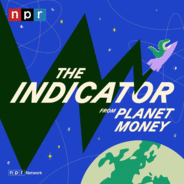Pakistan has had some major economic bumps as of late, including a near default in 2023. At the root: seriously low tax collection. Millions of Pakistan residents opt out of paying income taxes entirely. This is a problem a lot of lower- and middle-income countries face. On today's show, we talk about why there are so many tax dodgers in Pakistan and what the government is trying to do about it. Related episodes: Is the US pushing countries towards China? A brief history of income taxes For sponsor-free episodes of The Indicator from Planet Money, subscribe to Planet Money+ via Apple Podcasts or at plus.npr.org. Fact-checking by Sierra Juarez. Music by Drop Electric. Find us: TikTok, Instagram, Facebook, Newsletter. Learn more about sponsor message choices: podcastchoices.com/adchoicesNPR Privacy Policy

Wirtschaft
The Indicator from Planet Money Folgen
A bite-sized show about big ideas. From the people who make Planet Money, The Indicator helps you make sense of what's happening in today's economy. It's a quick hit of insight into money, work, and business. Monday through Friday, in 10 minutes or less.
Folgen von The Indicator from Planet Money
300 Folgen
-
Folge vom 26.01.2026How Pakistan is revving up a fight against tax dodgers
-
Folge vom 23.01.2026Davos drama, credit card caps and tariff truthsIt’s time for … Indicators of the Week! Our weekly look at some of the most fascinating economic numbers from the news. On today’s episode: Why does Davos feel interesting this year? What if we did cap credit card interest rates? And we’re paying most of those tariffs, aren’t we? Also, big news! Planet Money wrote a book and we’re going on tour this spring. Find tickets and info at planetmoneybook.com. Related episodes: Trump's backup options for tariffs Globalization At Davos: What Happened? The carbon coin: A novel idea For sponsor-free episodes of The Indicator from Planet Money, subscribe to Planet Money+ via Apple Podcasts or at plus.npr.org. Fact-checking by Sierra Juarez. Music by Drop Electric. Find us: TikTok, Instagram, Facebook, Newsletter. Learn more about sponsor message choices: podcastchoices.com/adchoicesNPR Privacy Policy
-
Folge vom 22.01.2026How beef climbed to the top of the food pyramidBeef is back on top. Well, at least on top of Health Secretary Robert F. Kennedy Jr.’s new food pyramid, unveiled alongside updated national dietary guidelines. Red meat really never left the great American menu. But how’d it climb all the way up there?On today’s show, America’s storied love affair with beef. And how big business and government have long influenced what winds up on our plates.Related episodes: Why beef prices are so highWho’s buying all the beef?For sponsor-free episodes of The Indicator from Planet Money, subscribe to Planet Money+ via Apple Podcasts or at plus.npr.org. Fact-checking by Sierra Juarez. Music by Drop Electric. Find us: TikTok, Instagram, Facebook, Newsletter.Learn more about sponsor message choices: podcastchoices.com/adchoicesNPR Privacy Policy
-
Folge vom 21.01.2026Is Greenland really an untapped land of riches?President Donald Trump is dead set on acquiring Greenland, and while national security is the stated reason, the country’s untapped mineral wealth could offer another explanation. Today on the show: is Greenland really an untapped land of riches? We talk to one Australian geologist who discovered the great costs and potential rewards of extracting these minerals himself. Related episodes: Add to cart: Greenland Why Trump resurrected the Monroe Doctrine For sponsor-free episodes of The Indicator from Planet Money, subscribe to Planet Money+ via Apple Podcasts or at plus.npr.org. Fact-checking by Sierra Juarez and Julia Ritchey. Music by Drop Electric. Find us: TikTok, Instagram, Facebook, Newsletter. Learn more about sponsor message choices: podcastchoices.com/adchoicesNPR Privacy Policy
